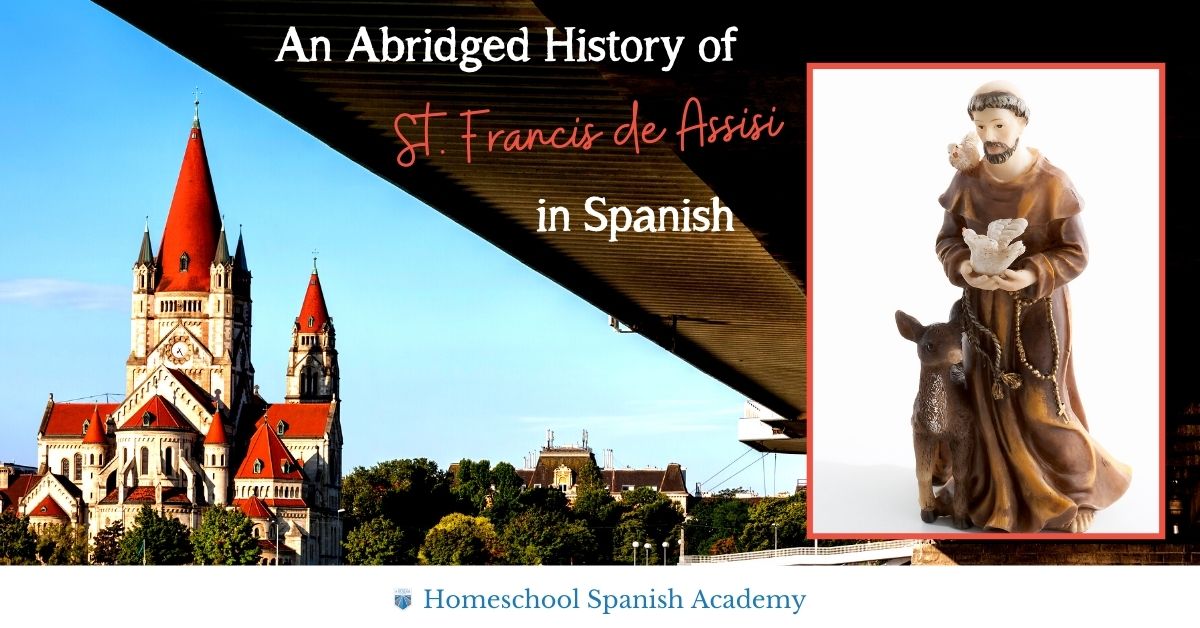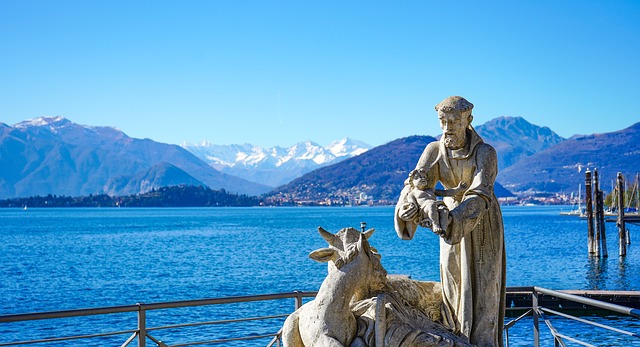
An Abridged History of St. Francis of Assisi for Your Spanish Learner
Every year on October 4th, people around the world celebrate the life of St. Francis of Assisi. He is one of the most famous and loved Catholic saints.
Whether you’ve celebrated the Feast of St. Francis de Assisi all your life or this is your first time, there’s so much to learn, especially in your second language! In this blog post, we’ll briefly review the life of St. Francis, study some related Spanish vocabulary, and discover eight wonderful ways to commemorate the holiday. ¡Aprendamos sobre San Francisco!
The Life of St. Francis of Assisi
St. Francis was born in 1181 in Assisi of Umbria, Italy where his mother named him Giovanni after John the Baptist. Unfortunately for his father, he didn’t attend the birth and lost the opportunity to name him as he wished. Because his father wanted a working son to follow in his footsteps, he was unhappy about the boy’s chosen name and soon renamed him Francesco, which means Frenchman in Italian.
While his name may not seem important, it helped mold who he became and what he is known for today. Years later, Francis grew into an extremely successful businessman like his father, and he is now the patron of merchants, among other things—as we’ll discuss below.

His Early Years
Thanks to his father’s success, Francis grew up in a prosperous, carefree world. The adults around him doted upon him and spoiled him throughout his childhood, which contributed to his enjoying a lively social life as an adult.
Like most young men of his era, Francis desired nobility, knighthood, and recognition. To achieve such greatness, he enlisted as a soldier in a brutal war between Assisi and Perugia. While the Perugians simply killed most soldiers from Assisi, they preferred to kidnap Francis (and other wealthy soldiers) for ransom, during which time they kept them in solitary confinement.
After a year of imprisonment, Francis enjoyed freedom again. He decided to join the Crusades in further pursuit of greatness.
His Conversion
Despite his conviction to join the Crusades, he lasted only one day on the road. His first night of traveling, he had a dream from God. Similar to the story of Paul, God told Francis that he needed to fix his ways and go back home.
Of course, his decision to return after but a day was met with ridicule and a loss of the glory he so hopefully longed for.
As it does with many, Francis’ path of change took years. At first, he struggled with balancing his calling and desire to serve God. Then, one key moment marked a turning point on his journey to sainthood:
He felt God call him to repair the church, which spurred him to sell some of his father’s store merchandise to pay for the necessary materials. Unfortunately, his dad didn’t understand why he would do such a thing and took him to the bishop, accusing him of thievery. At that moment, Francis realized he had a heavenly father to honor, and he removed the clothes from his body and returned them to his father, leaving the church half naked.
From then on, his life was marked by extreme selflessness.
His Ministry
Going from nobility to poverty was an extreme change, and many people ridiculed Francis for his decisions. He often slept outside, ate garbage, or begged for food. While it seemed like an unpleasant life to many people, he found he was content in his relationship with God.
With his extreme generosity, kindness, and love, Francis soon gained a brotherhood of people who wanted to live like him. While he was never a priest, he taught those around him to denounce material things and live radically for God.
One of the most interesting aspects of his beliefs was his relationship with nature. He truly believed that every living creature, from plants to animals to humans, were part of a united brotherhood. He had the utmost respect for nature and was known for talking and even preaching to the animals. Because of this, he became the patron saint of animals and ecology.
St. Francis of Assisi Vocabulary
One way to celebrate St. Francis of Assisi is to learn about his life in Spanish. Since numerous people in Latin America identify as Catholics, thousands of people in this region of the world also celebrate the Feast of St. Francis. You can use the following vocabulary to talk about this day of celebration with your Spanish-speaking friends.
As you review the vocabulary, take note of any new words. Pay close attention to the pronunciation, and practice in your free time! Once you feel ready, use the vocabulary to create short sentences about St. Francis’ life.
| English | Spanish |
| Saint | El santo |
| Church | La iglesia |
| Catholicism | El catolicismo |
| Catholic | católico |
| Pope | El Papa |
| Wealthy | Rico, adinerado |
| Riches | Las riquezas |
| Noble | Noble, el aristócrata |
| Knight | El caballero |
| Charming | Encantador |
| Family | La familia |
| War | La guerra |
| Crusades | Las Cruzadas |
| God | Dios |
| Voice | La voz |
| Conversion | La conversación |
| Poverty | La pobreza |
| To give | Dar |
| To believe | Creer |
| Selfless | Desinteresado, altruista |
| Generous | Generoso |
| Possessions | Las posesiones |
| Brotherhood | La fraternidad, la hermandad |
| Supporters | Los apoyantes |
| Rags | Los harapos |
| To preach | Predicar |
| Nature | La naturaleza |
| Environment | El ambiente |
| Animals | Los animales |
| Respect | El respeto |
| Love | El amor |
| Honor | El honor |
| To honor | Honrar |
| Celebration | La celebración |
| To celebrate | Celebrar |
Example Sentences
San Francisco era un hombre ejemplar.
St. Francis was an exemplary man.
San Francisco tenía mucho respeto y amor por el ambiente.
St. Francis had a lot of respect and love for the environment.
Una gran hermandad siguió a San Francisco de Assisi.
A large brotherhood followed St. Francis of Assisi.
Aunque San Francisco nació con riquezas, dedicó su vida a la pobreza radical.
Even though St. Francis was born with riches, he dedicated his life to radical poverty.
Su conversión al catolicismo pasó cuando escuchó la voz de Dios.
His conversion to Catholicism happened when he heard the voice of God.
San Francisco creía que las posesiones no eran necesarias para estar contento.
St. Francis believed that possessions were not necessary to be happy.
Él dio muchas cosas a los pobres.
He gave many things to the poor.
San Francisco nunca fue sacerdote, pero enseñó a muchas personas.
St. Francis was never a priest, but he taught a lot of people.
Hoy en día, San Francisco es el santo patrón de los animales, ecología y el comerciante.
Today, St. Francis is the patron saint of animals, ecology, and merchants.
Podemos honrar a San Francisco a través de nuestra bondad y respeto a todos los hermanos, incluso los animales.
We can honor St. Francis through our kindness and respect to all our brothers and sisters, including animals.
St. Francis of Assisi Quotes
Like the other saints, St. Francis was full of wisdom. A great way to honor him on this day of celebration is to meditate on his words. Plus, you can always take it to the next level and memorize the quotes in Spanish!
As you read these quotes, compare the English and Spanish vocabulary and sentence structure. For the most part, the Spanish form is a word-for-word translation of the English quote, making them easy to study.
“All the darkness in the world cannot extinguish the light of a single candle.”
“Toda la oscuridad en el mundo no puede extinguir la luz de una sola vela.”
“For it is in giving that we receive.”
“Porque dando, recibimos.”
“If we had any possessions we should need weapons and laws to defend them.”
“Si tuviéramos posesiones, necesitaríamos armas y leyes para defenderlas.”
“A single sunbeam is enough to drive away many shadows.”
“Un solo rayo del sol es suficiente para quitar muchas sombras.”
“Start by doing what’s necessary, then do what’s possible, and suddenly you are doing the
impossible.”
“Empieza haciendo lo necesario, luego lo posible, y de repente estás haciendo lo imposible.”
8 Ways to Celebrate the Feast of St. Francis de Assisi
In addition to reviewing the above Spanish vocabulary and quotes, you can continue celebrating and honoring St. Francis in several other ways. Below are ideas for students of all ages to engage in on this special day.
Make a Zoo
Since St. Francis of Assisi is the patron saint of animals, a fantastic way to honor him is by celebrating animals. For younger students, make a zoo!
Use molding clay, cardboard, cutouts, or stuffed animals to design a zoo. Talk with your child about the uniqueness of each animal, how they contribute to the environment, and what we can do to protect them.
As an added step, talk about the animals and their environment in Spanish! You can even involve the family pets for a more interactive element.
Animal Puppets
Another fun animal craft is making animal puppets out of bags, cloth, foam, or other materials. Once you and your student have finished making the puppets, write a script together to discuss the importance of honoring all living creatures.
Again, encourage your student to practice their Spanish vocabulary while making the puppets and doing the show.
Gratitude Poem
St. Francis de Assisi lived with neither possessions nor a house, yet he was incredibly joyous. Take some time to think about what you’re grateful for today, from the shoes on your feet to the roof over your head.
Show off your writing skills by putting your words of thankfulness into a poem. If possible, write versions of the poem in both English and Spanish. If you are unsure of how to write a poem in Spanish, the rules are basically the same! Start off with a short haiku to help you get the feel of writing in Spanish, then move on to longer poems.
Honor Your Pets
Since St. Francis of Assisi is the patron saint of animals, it is a common tradition to take this special day to bless your pets. Some people take their animals to the priest for an official blessing, while others just make sure to give some extra love and care to their furry friends.
Organize a Giveaway
As you review the life of St. Francis of Assisi, you may begin to realize that you can let go of some material possessions. His life of radical poverty and generosity is an example of how we can freely give to those in need.
Take a look around your home and see if there is anything of good quality that you don’t use anymore. Collect clothes, shoes, toys, and non-perishable foods to take to your local shelter.
Visit an Animal Shelter
Consider giving some of the homeless dogs and cats some love at your local animal shelter by volunteering—or fostering or adopting a pet. Since St. Francis saw animals as part of our brotherhood, our kindness and generosity can extend to them, especially the animals without a home.
Spend Time in Nature
Another way to appreciate the beautiful environment around us is to get out in nature. Leave your devices at home and fully immerse yourself in the great outdoors.
Take some time to think about why St. Francis believed that the animals, plants, and stars were part of the brotherhood. Study the intricate details of nature and take some time to appreciate its majesty.
Volunteer
Finally, a brilliant way to show generosity and kindness is to volunteer. You could help serve food at a homeless shelter, clean up a local park or beach, or teach people how to read. However you choose to volunteer and serve your neighbors, it will be a fantastic representation of the life of St. Francis of Assisi.
What Do You Think?
So, with all this information about St. Francis of Assisi and how to celebrate this day honoring him, what are your thoughts? Have you ever celebrated this feast before? How do you plan on doing so this year?
Please share your thoughts with us in a comment. You can even try out your Spanish skills and create your own sentence about St. Francis. We can’t wait to hear from you!
Do you love Spanish and Latin American history? Check out our latest posts!
- Keep Your Spanish Skills Sharp Over Summer Vacation
- Master All the Forms of Ser in Spanish: Your Ultimate Grammar Guide
- All You Need to Know About Spanish as a Second Language
- Discover the Joy of Learning Spanish with Summer Fun Activities
- Are Bilingual Children More Likely to Experience a Speech or Language Delay?
- What Is An Umbrella School?
- The Best Homeschool Spanish Curriculum at HSA
- Ride the Wave: Why Bilingualism in English and Spanish Is Your Ticket to Success
- Ser Conjugation: Free Spanish Lesson, Quiz, Exercises, and PDF - January 18, 2023
- 20 Colombian Spanish Phrases You Definitely Want to Know - November 4, 2022
- Ir + a + Infinitive: The Near Future Tense in Spanish - September 28, 2022





